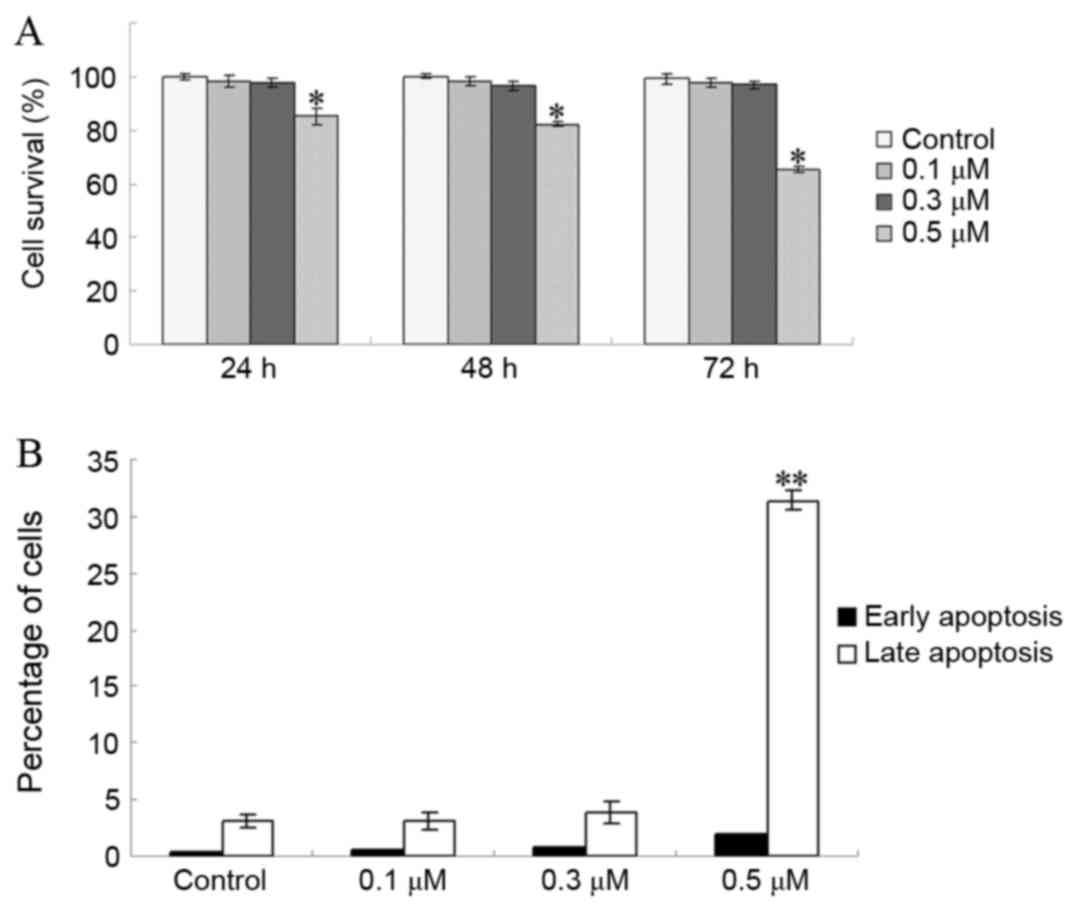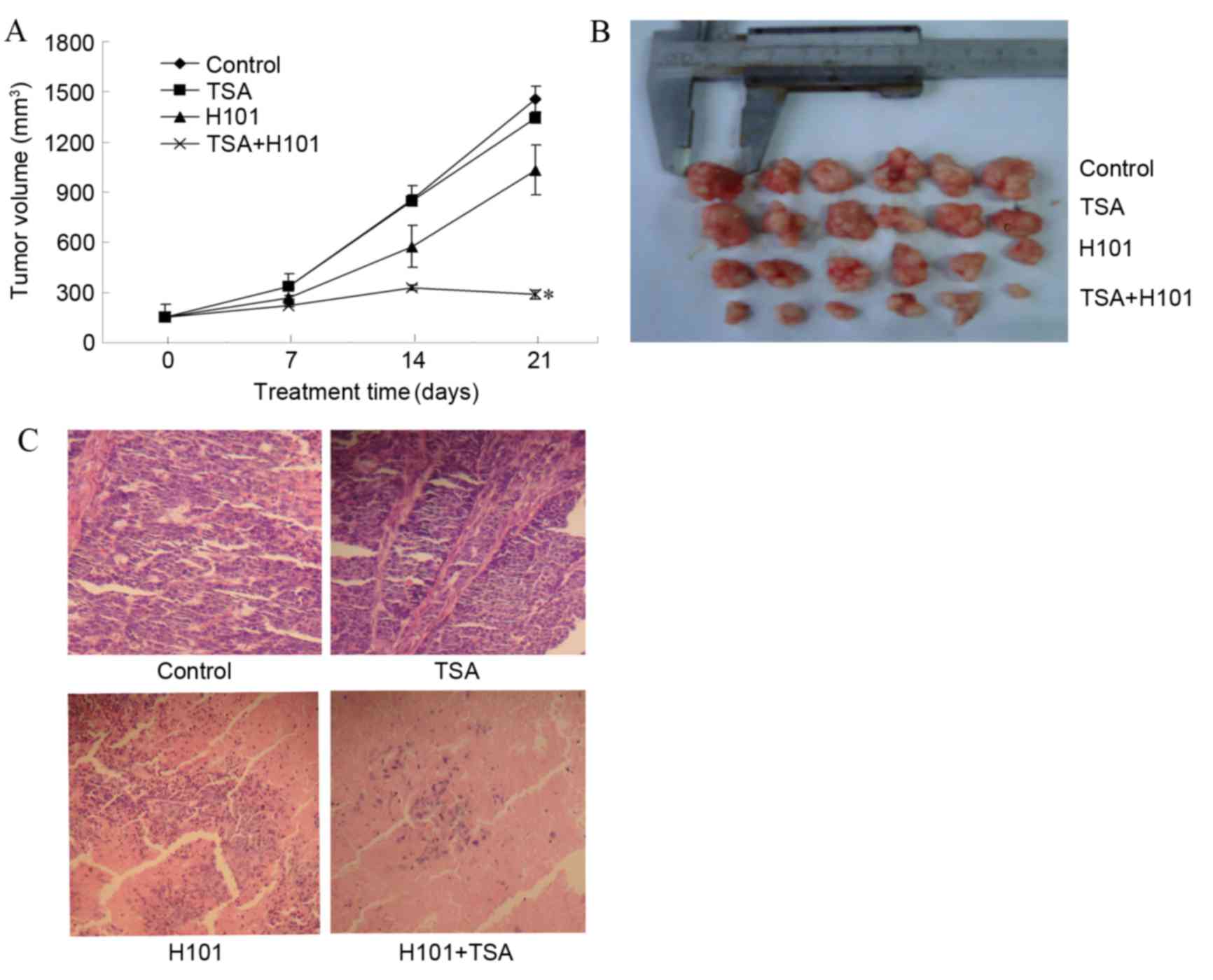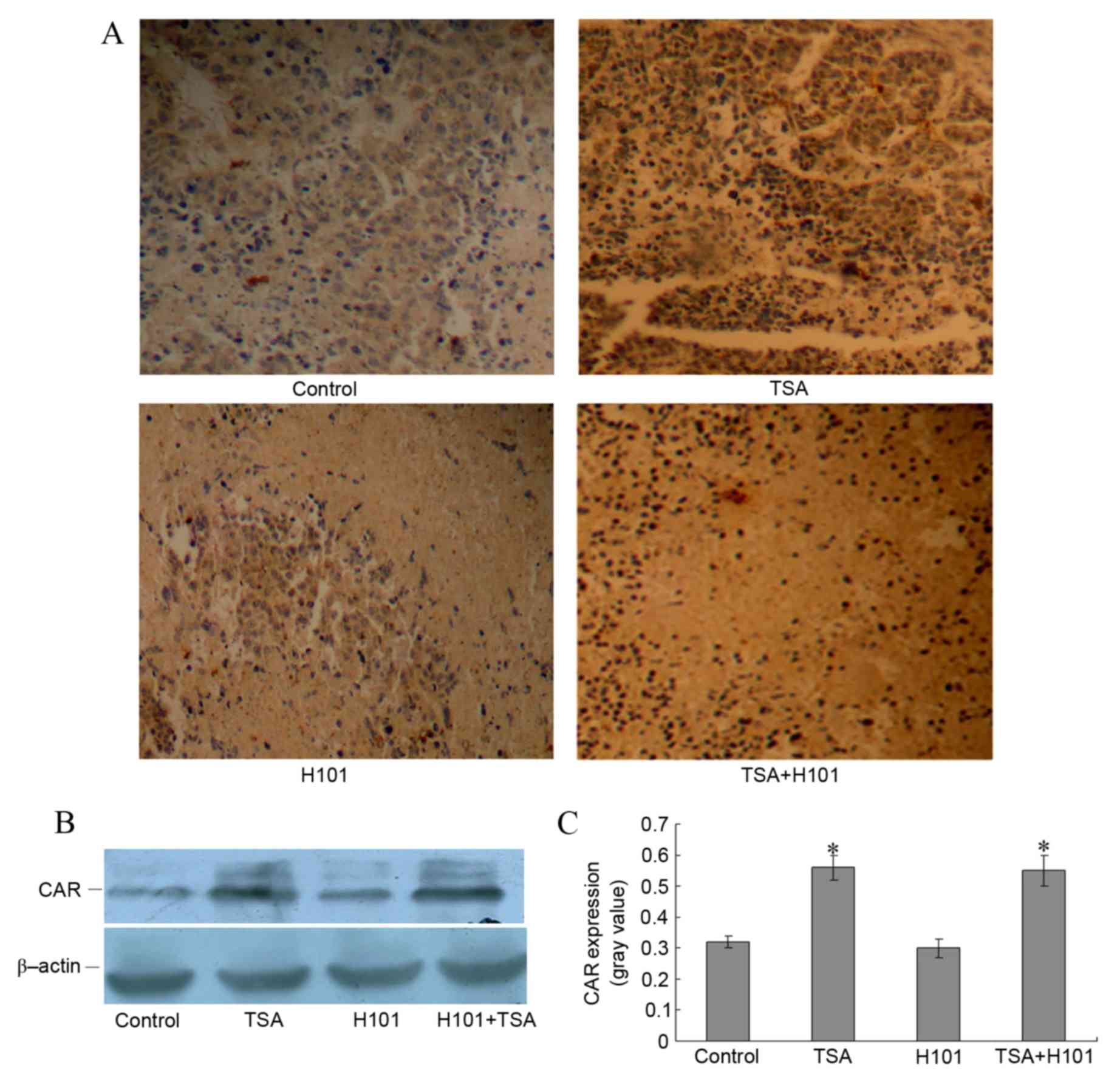|
1
|
Fujiwara Y, Yoshikawa R, Kamikonya N,
Nakayama T, Kitani K, Tsujie M, Yukawa M, Inoue M and Yamamura T:
Trimodality therapy of esophagectomy plus neoadjuvant
chemoradiotherapy improves the survival of clinical stage II/III
esophageal squamous cell carcinoma patients. Oncol Rep. 28:446–452.
2012.PubMed/NCBI
|
|
2
|
Jemal A, Center MM, DeSantis C and Ward
EM: Global patterns of cancer incidence and mortality rates and
trends. Cancer Epidemiol Biomarkers Prev. 19:1893–1907. 2010.
View Article : Google Scholar : PubMed/NCBI
|
|
3
|
Bonavina L, Incarbone R, Saino G, Clesi P
and Peracchia A: Clinical outcome and survival after esophagectomy
for carcinoma in elderly patients. Dis Esophagus. 16:90–93. 2003.
View Article : Google Scholar : PubMed/NCBI
|
|
4
|
Wang Y, Thorne S, Hannock J, Francis J, Au
T, Reid T, Lemoine N, Kirn D and Halldén G: A novel assay to assess
primary human cancer infectibility by replication-selective
oncolytic adenoviruses. Clin Cancer Res. 11:351–360.
2005.PubMed/NCBI
|
|
5
|
Zhu H, Huo X, Chen L, Wang H and Yu H:
Clinical experience with radio-, chemo- and hyperthermotherapy
combined trimodality on locally advanced esophageal cancer. Mol
Clin Oncol. 1:1009–1012. 2013.PubMed/NCBI
|
|
6
|
Fujiwara Y, Yoshikawa R, Kamikonya N,
Nakayama T, Kitani K, Tsujie M, Yukawa M, Hara J, Yamamura T and
Inoue M: Neoadjuvant chemoradiotherapy followed by esophagectomy
vs. surgery alone in the treatment of resectable esophageal
squamous cell carcinoma. Mol Clin Oncol. 1:773–779. 2013.PubMed/NCBI
|
|
7
|
Minsky BD, Pajak TF, Ginsberg RJ, Pisansky
TM, Martenson J, Komaki R, Okawara G, Rosenthal SA and Kelsen DP:
INT 0123 (Radiation Therapy Oncology Group 94–05) phase III trial
of combined-modality therapy for esophageal cancer: High-dose
versus standard-dose radiation therapy. J Clin Oncol. 20:1167–1174.
2002. View Article : Google Scholar : PubMed/NCBI
|
|
8
|
Garber K: China approves world's first
oncolytic virus therapy for cancer treatment. J Natl Cancer Inst.
98:298–300. 2006. View Article : Google Scholar : PubMed/NCBI
|
|
9
|
Lu W, Zheng S, Li XF, Huang JJ, Zheng X
and Li Z: Intra-tumor injection of H101, a recombinant adenovirus,
in combination with chemotherapy in patients with advanced cancers:
A pilot phase II clinical trial. World J Gastroenterol.
10:3634–3638. 2004. View Article : Google Scholar : PubMed/NCBI
|
|
10
|
Toth K and Wold WS: Increasing the
efficacy of oncolytic adenovirus vectors. Viruses. 2:1844–1866.
2010. View
Article : Google Scholar : PubMed/NCBI
|
|
11
|
Thorne SH, Hermiston T and Kirn D:
Oncolytic virotherapy: Approaches to tumor targeting and enhancing
antitumor effects. Semin Oncol. 32:537–548. 2005. View Article : Google Scholar : PubMed/NCBI
|
|
12
|
Lichtenstein DL and Wold WS: Experimental
infections of humans with wild-type adenoviruses and with
replication-competent adenovirus vectors: Replication, safety and,
transmission. Cancer Gene Ther. 11:819–829. 2004. View Article : Google Scholar : PubMed/NCBI
|
|
13
|
Nettelbeck DM, Jérôme V and Müller R: Gene
therapy: Designer promoters for tumour targeting. Trends Genet.
16:174–181. 2000. View Article : Google Scholar : PubMed/NCBI
|
|
14
|
Tysome JR, Lemoine NR and Wang Y:
Combination of anti-angiogenic therapy and virotherapy: Arming
oncolytic viruses with anti-angiogenic genes. Curr Opin Mol Ther.
11:664–669. 2009.PubMed/NCBI
|
|
15
|
Nguyen TL, Wilson MG and Hiscott J:
Oncolytic viruses and histone deacetylase inhibitors-a
multi-pronged strategy to target tumor cells. Cytokine Growth
Factor Rev. 21:153–159. 2010. View Article : Google Scholar : PubMed/NCBI
|
|
16
|
Reid TR, Freeman S, Post L, McCormick F
and Sze DY: Effects of Onyx-015 among metastatic colorectal cancer
patients that have failed prior treatment with 5-FU/leucovorin.
Cancer Gene Ther. 12:673–681. 2005. View Article : Google Scholar : PubMed/NCBI
|
|
17
|
Kumar S, Gao L, Yeagy B and Reid T: Virus
combinations and chemotherapy for the treatment of human cancers.
Curr Opin Mol Ther. 10:371–379. 2008.PubMed/NCBI
|
|
18
|
Bhattacharyya M, Francis J, Eddouadi A,
Lemoine NR and Halldén G: An oncolytic adenovirus defective in
pRb-binding (dl922-947) can efficiently eliminate pancreatic cancer
cells and tumors in vivo in combination with 5-FU or gemcitabine.
Cancer Gene Ther. 18:734–743. 2011. View Article : Google Scholar : PubMed/NCBI
|
|
19
|
Barbetti V, Gozzini A, Cheloni G, Marzi I,
Fabiani E, Santini V, Sbarba P Dello and Rovida E: Time- and
residue-specific differences in histone acetylation induced by VPA
and SAHA in AML1/ETO-positive leukemia cells. Epigenetics.
8:210–219. 2013. View Article : Google Scholar : PubMed/NCBI
|
|
20
|
Ellis L, Atadja PW and Johnstone RW:
Epigenetics in cancer: Targeting chromatin modifications. Mol
Cancer Ther. 8:1409–1420. 2009. View Article : Google Scholar : PubMed/NCBI
|
|
21
|
Meng F, Sun G, Zhong M, Yu Y and Brewer
MA: Inhibition of DNA methyltransferases, histone deacetylases and
lysine-specific demethylase-1 suppresses the tumorigenicity of the
ovarian cancer ascites cell line SKOV3. Int J Oncol. 43:495–502.
2013.PubMed/NCBI
|
|
22
|
Wilson PM, Labonte MJ, Martin SC, Kuwahara
ST, El-Khoueiry A, Lenz HJ and Ladner RD: Sustained inhibition of
deacetylases is required for the antitumor activity of the histone
deactylase inhibitors panobinostat and vorinostat in models of
colorectal cancer. Invest New Drugs. 31:845–857. 2013. View Article : Google Scholar : PubMed/NCBI
|
|
23
|
Minucci S and Pelicci PG: Histone
deacetylase inhibitors and the promise of epigenetic (and more)
treatments for cancer. Nat Rev Cancer. 6:38–51. 2006. View Article : Google Scholar : PubMed/NCBI
|
|
24
|
Stankov MV, El Khatib M, Thakur B Kumar,
Heitmann K, Panayotova-Dimitrova D, Schoening J, Bourquin JP,
Schweitzer N, Leverkus M, Welte K, et al: Histone deacetylase
inhibitors induce apoptosis in myeloid leukemia by suppressing
autophagy. Leukemia. 28:577–588. 2014. View Article : Google Scholar : PubMed/NCBI
|
|
25
|
Ye RR, Ke ZF, Tan CP, He L, Ji LN and Mao
ZW: Histone-deacetylase-targeted fluorescent ruthenium(II)
polypyridyl complexes as potent anticancer agents. Chemistry.
19:10160–10169. 2013. View Article : Google Scholar : PubMed/NCBI
|
|
26
|
Chen X, Xiao W, Chen W, Luo L, Ye S and
Liu Y: The epigenetic modifier trichostatin A, a histone
deacetylase inhibitor, suppresses proliferation and
epithelial-mesenchymal transition of lens epithelial cells. Cell
Death Dis. 4:e8842013. View Article : Google Scholar : PubMed/NCBI
|
|
27
|
Yen CC, Chen YJ, Chen JT, Hsia JY, Chen
PM, Liu JH, Fan FS, Chiou TJ, Wang WS and Lin CH: Comparative
genomic hybridization of esophageal squamous cell carcinoma:
Correlations between chromosomal aberrations and disease
progression/prognosis. Cancer. 92:2769–2777. 2001. View Article : Google Scholar : PubMed/NCBI
|
|
28
|
Li LX, Zhang YL, Zhou L, Ke ML, Chen JM,
Fu X, Ye CL, Wu JX, Liu RY and Huang W: Antitumor efficacy of a
recombinant adenovirus encoding endostatin combined with an
E1B55KD-deficient adenovirus in gastric cancer cells. J Transl Med.
11:2572013. View Article : Google Scholar : PubMed/NCBI
|
|
29
|
Huang H, Xiao T, He L, Ji H and Liu XY:
Interferon-β-armed oncolytic adenovirus induces both apoptosis and
necroptosis in cancer cells. Acta Biochim Biophys Sin (Shanghai).
44:737–745. 2012. View Article : Google Scholar : PubMed/NCBI
|
|
30
|
Essmann F and Schulze-Osthoff K:
Translational approaches targeting the p53 pathway for anti-cancer
therapy. Br J Pharmacol. 165:328–344. 2012. View Article : Google Scholar : PubMed/NCBI
|
|
31
|
Krell J, Frampton AE, Colombo T, Gall TM,
de Giorgio A, Harding V, Stebbing J and Castellano L: The p53 miRNA
interactome and its potential role in the cancer clinic.
Epigenomics. 5:417–428. 2013. View Article : Google Scholar : PubMed/NCBI
|
|
32
|
Lee JY, Kim HJ, Yoon NA, Lee WH, Min YJ,
Ko BK, Lee BJ, Lee A, Cha HJ, Cho WJ and Park JW: Tumor suppressor
p53 plays a key role in induction of both tristetraprolin and let-7
in human cancer cells. Nucleic Acids Res. 41:5614–5625. 2013.
View Article : Google Scholar : PubMed/NCBI
|
|
33
|
Huang K, Chen L, Zhang J, Wu Z, Lan L,
Wang L, Lu B and Liu Y: Elevated p53 expression levels correlate
with tumor progression and poor prognosis in patients exhibiting
esophageal squamous cell carcinoma. Oncol Lett. 8:1441–1446.
2014.PubMed/NCBI
|
|
34
|
D'Assoro AB, Leontovich A, Amato A,
Ayers-Ringler JR, Quatraro C, Hafner K, Jenkins RB, Libra M, Ingle
J, Stivala F, et al: Abrogation of p53 function leads to metastatic
transcriptome networks that typify tumor progression in human
breast cancer xenografts. Int J Oncol. 37:1167–1176.
2010.PubMed/NCBI
|
|
35
|
Song X, Zhou Y, Jia R, Xu X, Wang H, Hu J,
Ge S and Fan X: Inhibition of retinoblastoma in vitro and in vivo
with conditionally replicating oncolytic adenovirus H101. Invest
Ophthalmol Vis Sci. 51:2626–2635. 2010. View Article : Google Scholar : PubMed/NCBI
|
|
36
|
Alvarez-Breckenridge C, Kaur B and Chiocca
EA: Pharmacologic and chemical adjuvants in tumor virotherapy. Chem
Rev. 109:3125–3140. 2009. View Article : Google Scholar : PubMed/NCBI
|
|
37
|
Walters RW, Freimuth P, Moninger TO,
Ganske I, Zabner J and Welsh MJ: Adenovirus fiber disrupts
CAR-mediated intercellular adhesion allowing virus escape. Cell.
110:789–799. 2002. View Article : Google Scholar : PubMed/NCBI
|
|
38
|
Kothari V, Joshi G, Nama S, Somasundaram K
and Mulherkar R: HDAC inhibitor valproic acid enhances tumor cell
kill in adenovirus-HSVtk mediated suicide gene therapy in HNSCC
xenograft mouse model. Int J Cancer. 126:733–742. 2010. View Article : Google Scholar : PubMed/NCBI
|
|
39
|
Auer D, Reimer D, Porto V, Fleischer M,
Roessler J, Wiedemair A, Marth C, Müller-Holzner E, Daxenbichler G
and Zeimet AG: Expression of coxsackie-adenovirus receptor is
related to estrogen sensitivity in breast cancer. Breast Cancer Res
Treat. 116:103–111. 2009. View Article : Google Scholar : PubMed/NCBI
|
|
40
|
MacTavish H, Diallo JS, Huang B, Stanford
M, Le Boeuf F, de Silva N, Cox J, Simmons JG, Guimond T, Falls T,
et al: Enhancement of vaccinia virus based oncolysis with histone
deacetylase inhibitors. PLoS One. 5:e144622010. View Article : Google Scholar : PubMed/NCBI
|
|
41
|
Sauthoff H, Hu J, Maca C, Goldman M,
Heitner S, Yee H, Pipiya T, Rom WN and Hay JG: Intratumoral spread
of wild-type adenovirus is limited after local injection of human
xenograft tumors: Virus persists and spreads systemically at late
time points. Hum Gene Ther. 14:425–433. 2003. View Article : Google Scholar : PubMed/NCBI
|
|
42
|
Eikenes L, Brekken ØS, Bruland C and Cde L
Davies: Collagenase increases the transcapillary pressure gradient
and improves the uptake and distribution of monoclonal antibodies
in human osteosarcoma xenografts. Cancer Res. 64:4768–4773. 2004.
View Article : Google Scholar : PubMed/NCBI
|
|
43
|
Ferreira TB, Ferreira AL, Carrondo MJ and
Alves PM: Two different serum-free media and osmolality effect upon
human 293 cell growth and adenovirus production. Biotechnol Lett.
27:1809–1813. 2005. View Article : Google Scholar : PubMed/NCBI
|
|
44
|
Henry O, Dormond E, Perrier M and Kamen A:
Insights into adenoviral vector production kinetics in acoustic
filter-based perfusion cultures. Biotechnol Bioeng. 86:765–774.
2004. View Article : Google Scholar : PubMed/NCBI
|
|
45
|
Jardon M and Garnier A: PH, pCO2, and
temperature effect on R-adenovirus production. Biotechnol Prog.
19:202–208. 2003. View Article : Google Scholar : PubMed/NCBI
|
|
46
|
Ma J, Zhao J, Lu J, Jiang Y, Yang H, Li P,
Zhao M, Liu K and Dong Z: Coxsackievirus and adenovirus receptor
promotes antitumor activity of oncolytic adenovirus H101 in
esophageal cancer. Int J Mol Med. 30:1403–1409. 2012.PubMed/NCBI
|
|
47
|
Chen G, Wang BB, Li FJ, Liu DY, Zhou JF,
Lu YP and Ma D: Enhancive effect of histone deacetylase inhibitor
trichostatin a on transfection efficiency of adenovirus in ovarian
carcinoma cell line A2780. Ai Zheng. 24:1196–1200. 2005.(In
Chinese). PubMed/NCBI
|
|
48
|
Pandha HS, Stockwin LH, Eaton J, Clarke
IA, Dalgleish AG, Todryk SM and Blair GE: Coxsackie B and
adenovirus receptor, integrin and major histocompatibility complex
class I expression in human prostate cancer cell lines:
Implications for gene therapy strategies. Prostate Cancer Prostatic
Dis. 6:6–11. 2003. View Article : Google Scholar : PubMed/NCBI
|


















